英语常用介词用法
40个英语介词用法总结
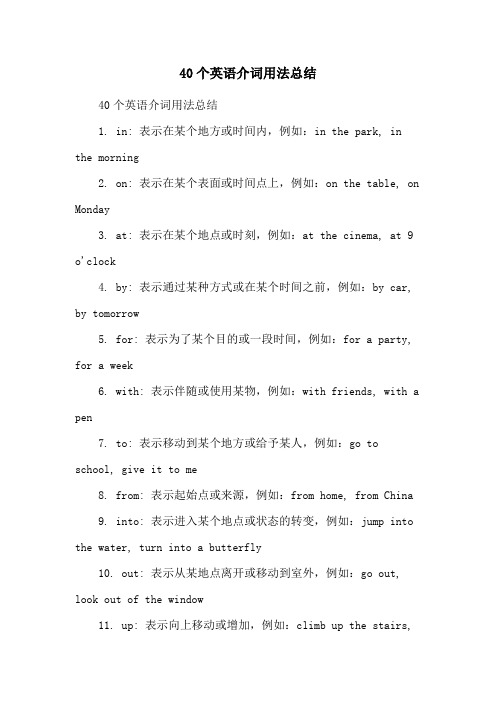
40个英语介词用法总结40个英语介词用法总结1. in: 表示在某个地方或时间内,例如:in the park, in the morning2. on: 表示在某个表面或时间点上,例如:on the table, on Monday3. at: 表示在某个地点或时刻,例如:at the cinema, at 9 o'clock4. by: 表示通过某种方式或在某个时间之前,例如:by car, by tomorrow5. for: 表示为了某个目的或一段时间,例如:for a party, for a week6. with: 表示伴随或使用某物,例如:with friends, with a pen7. to: 表示移动到某个地方或给予某人,例如:go to school, give it to me8. from: 表示起始点或来源,例如:from home, from China9. into: 表示进入某个地点或状态的转变,例如:jump into the water, turn into a butterfly10. out: 表示从某地点离开或移动到室外,例如:go out, look out of the window11. up: 表示向上移动或增加,例如:climb up the stairs,wake up12. down: 表示向下移动或减少,例如:walk down the hill, calm down13. about: 表示关于某事或在某个范围内,例如:talk about the movie, wander about the city14. off: 表示离开或关闭,例如:get off the bus, turnoff the lights15. on: 表示打开或激活,例如:turn on the TV, switch on the computer16. over: 表示越过或在某地上方,例如:jump over the fence, fly over the city17. under: 表示在某物下面或被控制或影响,例如:hide under the bed, live under his rules18. with: 表示具有某种特征或和某人一起做某事,例如:a man with blue eyes, dance with me19. without: 表示没有某物或在缺乏某物的情况下,例如:go without food, live without regret20. by: 表示通过某种方式,例如:learn by doing, go by bus21. through: 表示穿过某物或完成某事,例如:walk through the door, go through the documents22. across: 表示横穿某物或在某个范围内,例如:swimacross the river, all across the world23. between: 表示在两个事物之间或在某个时间段,例如:choose between two options, between 9 and 10 o'clock24. among: 表示在三个或三个以上事物之间或在某群人中,例如:share among friends, discuss among colleagues25. around: 表示在周围或在某个时间点附近,例如:walk around the park, around midnight26. through: 表示通过某事物或在某段时间内,例如:read through the book, work through the night27. against: 表示反对或靠在某物上,例如:fight against injustice, lean against the wall28. for: 表示代表或支持某人或某事,例如:vote for a candidate, fight for freedom29. towards: 表示朝向某个方向或对某人有好感,例如:walk towards the beach, feel towards someone30. within: 表示在某个时间或范围内,例如:arrive within an hour, within the city limits31. beyond: 表示超出某个界限或超过某个程度,例如:beyond expectations, beyond the horizon32. along: 表示沿着某个路线或伴随某人一起,例如:walk along the street, sing along with the song33. above: 表示在某物之上或高于某个程度,例如:flyabove the clouds, above average34. below: 表示在某物之下或低于某个程度,例如:swim below the surface, below freezing35. beside: 表示在某物旁边或和某人一起,例如:sit beside me, beside the lake36. near: 表示在某物附近或接近某个时间,例如:live near the beach, near the end37. past: 表示经过某个地点或在某个时间之后,例如:walk past the store, past midnight38. around: 表示在周围或大约某个数量,例如:look around the room, around 20 people39. after: 表示在某个时间之后或追求某人或某事,例如:after dinner, run after the dog40. before: 表示在某个时间之前或在某个事件之前,例如:before sunrise, before the meeting这些介词是英语中常用的一些基本介词,它们在表达地点、时间、方式等方面起到了重要的作用。
超全的英语介词用法归纳总结
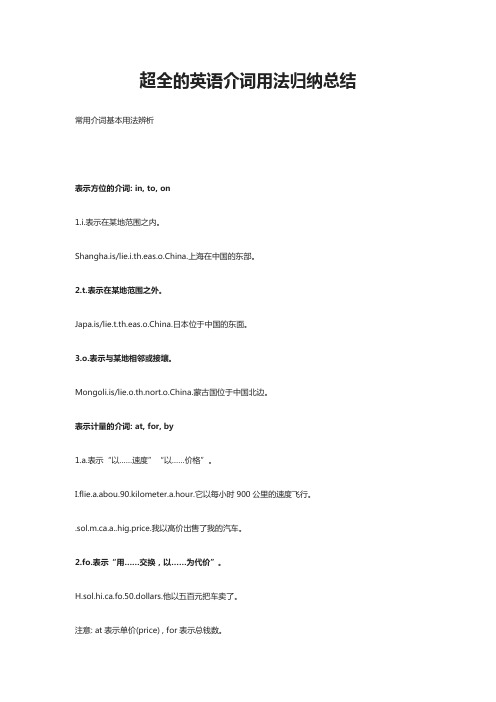
超全的英语介词用法归纳总结常用介词基本用法辨析表示方位的介词: in, to, on1.i.表示在某地范围之内。
Shangha.is/lie.i.th.eas.o.China.上海在中国的东部。
2.t.表示在某地范围之外。
Japa.is/lie.t.th.eas.o.China.日本位于中国的东面。
3.o.表示与某地相邻或接壤。
Mongoli.is/lie.o.th.nort.o.China.蒙古国位于中国北边。
表示计量的介词: at, for, by1.a.表示“以……速度”“以……价格”。
I.flie.a.abou.90.kilometer.a.hour.它以每小时900公里的速度飞行。
.sol.m.ca.a..hig.price.我以高价出售了我的汽车。
2.fo.表示“用……交换,以……为代价”。
H.sol.hi.ca.fo.50.dollars.他以五百元把车卖了。
注意: at表示单价(price) , for表示总钱数。
3.b.表示“以……计”, 后跟度量单位。
The.pai.hi.b.th.month.他们按月给他计酬。
Her.egg.ar.sol.b.weight.在这里鸡蛋是按重量卖的。
表示材料的介词: of, from, in1.o.成品仍可看出原料。
Thi.bo.i.mad.o.paper.这个盒子是纸做的。
2.fro.成品已看不出原料。
Win.i.mad.fro.grapes.葡萄酒是葡萄酿成的。
3.i.表示用某种材料或语言。
Pleas.fil.i.th.for.i.penci.first.请先用铅笔填写这个表格。
The.tal.i.English.他们用英语交谈。
表示工具或手段的介词: by, with, on1.b.用某种方式, 多用于交通。
.wen.ther.b.bus.我坐公共汽车去那儿。
2.with表示“用某种工具”。
H.brok.th.windo.wit..stone.他用石头把玻璃砸坏了。
15个英语最常见的介词用法-极简英语

15个英语最常见介词(in on at of for...)的深层次含义英文中15个最常见的介词in/ on/at/of/ for/by /with/ from/to/as/ about/ around/ off/ through/ over一、in (在..里面)1.表示真实的位置: in the car/room2表示抽象的位置: in the book/movie3.表示状态: in danger, in trouble; in anger3.表示时间: in the morning/afternoon/evening. in April; in 20104.表示方式: in the way; in English5.表示穿着: in black shoes/T-shirt二、on (紧紧地接触-连着)1.表示真实的位置: on the table/wall2.表示抽象的位置: on the radio/TV; on the topic/event3.表示具体的时间: on Monday; on Monday morning; on May 4th4.表示状态: on duty; on holiday; the game is on三、at(在.点上)1.表示真实的位置: at home/the company/the store2.表示抽象的位置: be good/bad at English3.表示具体的时间: at 3 pm;at night; at the age of 204.表示状态: at work-在工作; at table-在吃饭四、Of(的-从属关系)1.表示"无生命主体的":the window of the room; top of the mountain...2.某某市: the city of Bejing3.表示数量: a piece/bx/bottle/pair.. of五、for(为了/因为/对时间/对.而言/支持赞成)1.表示为了":go for a walk; I come here fr my schoolbag2.表示"因为": Thank you for helping me; for the reason3.表示"时间"和: for 3 days; for a week; for a year4.表示对..而言": It is important for me5.表示”支持,赞成": Are you for this plan or against it?六、by(通过.交通工具/在.附近/街至.时间/被)1.表示"通过.交通工具":by train/subway/plane/air/ship/seaI learn English by watchingEnglish movies.2.表示在附近":a table by the window; the house is by the lake3.表示"截至到..时间":by the end of next week; by 20194.表示"被(被动语态)":English is spoken by people all over the world.七、with (伴随)1.表示"和.起":go with:play with;make friends with;cooperate with2.表示"携有,带有":a county with a long history; a house with a big garden3.表示..工具:cut the apple with the knife4.表示"伴随":with the development of the society;with the help of my teacher;I don't have any cash with me.八、from (远离)1.表示"来自":I am/come from China;a gift from my best friend;a man from America2.由"远离"来记短语:stop/prevent/keep sb from doing sth阻止某人做某事be away from...远离...be different from与.不同be absent from缺席....how far is it from here?它离这远The paper is made from wood.这纸是由木头制成的3.表示..到": from...to...由"指向"来理解下列用法:The road leads to Paris.这条路通往巴黎Smoking is harmful to your health.吸烟有害健康the answer to the question.这个问题的答案九、to (指向..)contribute to对..做贡献on one's way to... 在某人去某地的路上belong to属于..be used to doing sth习惯于做某事lead to...导致十、as作为He works as a tour guide.他作为导游工作。
介词英语的用法总结
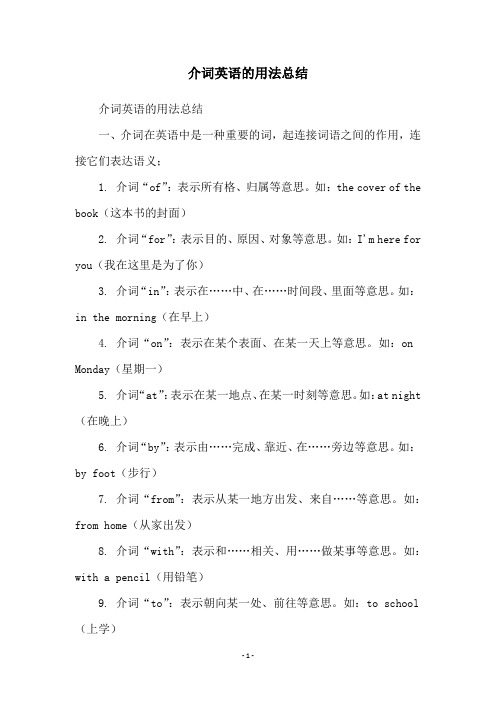
介词英语的用法总结介词英语的用法总结一、介词在英语中是一种重要的词,起连接词语之间的作用,连接它们表达语义;1. 介词“of”:表示所有格、归属等意思。
如:the cover of the book(这本书的封面)2. 介词“for”:表示目的、原因、对象等意思。
如:I'm here for you(我在这里是为了你)3. 介词“in”:表示在……中、在……时间段、里面等意思。
如:in the morning(在早上)4. 介词“on”:表示在某个表面、在某一天上等意思。
如:on Monday(星期一)5. 介词“at”:表示在某一地点、在某一时刻等意思。
如:at night (在晚上)6. 介词“by”:表示由……完成、靠近、在……旁边等意思。
如:by foot(步行)7. 介词“from”:表示从某一地方出发、来自……等意思。
如:from home(从家出发)8. 介词“with”:表示和……相关、用……做某事等意思。
如:with a pencil(用铅笔)9. 介词“to”:表示朝向某一处、前往等意思。
如:to school (上学)10.介词“for”:表示为了……、把……作为等意思。
如:for fun (为了好玩)11.介词“as”:表示作为、当……时等意思。
如:as a teacher (作为一个老师)12.介词“over”:表示在……上、穿过等意思。
如:over the bridge (过桥)13.介词“since”:表示从……起、既然等意思。
如:since then (从那时起)14.介词“into”:表示到……里面、转向等意思。
如:into the room(进房间)二、最后,需要强调的是,介词的使用要灵活搭配,以正确表达出英语句子的意思,以便达到更好的英语表达效果。
史上超全的英语介词用法归纳总结!不看太可惜了
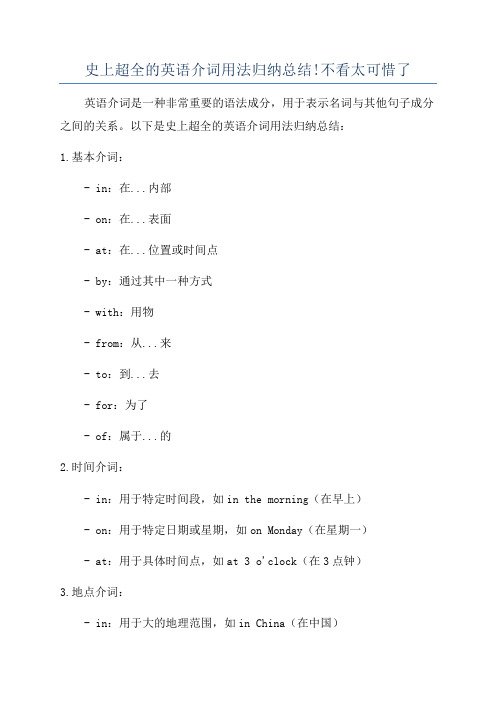
史上超全的英语介词用法归纳总结!不看太可惜了英语介词是一种非常重要的语法成分,用于表示名词与其他句子成分之间的关系。
以下是史上超全的英语介词用法归纳总结:1.基本介词:- in:在...内部- on:在...表面- at:在...位置或时间点- by:通过其中一种方式- with:用物- from:从...来- to:到...去- for:为了- of:属于...的2.时间介词:- in:用于特定时间段,如in the morning(在早上)- on:用于特定日期或星期,如on Monday(在星期一)- at:用于具体时间点,如at 3 o'clock(在3点钟)3.地点介词:- in:用于大的地理范围,如in China(在中国)- on:用于较小的地理范围或表面,如on the street(在街上)- at:用于具体地点,如at the supermarket(在超市)4.方向介词:- to:表示到达一些地方,如go to school(去学校)- into:表示进入一些地方,如go into the house(进入房子)- out of:表示离开一些地方,如get out of the car(离开车)5.原因介词:- because of:由于,如He is late because of the traffic(他因为交通堵塞而迟到)- due to:由于,如The flight was canceled due to bad weather(因为恶劣天气,航班被取消)6.动词短语介词:- look after:照顾,如She looks after her younger brother (她照顾她的弟弟)- take care of:照顾,如He takes care of his plants(他照顾他的植物)7.形容词短语介词:- interested in:对...感兴趣,如She is interested in music (她对音乐感兴趣)- good at:擅长...,如He is good at playing basketball(他擅长打篮球)8.其他常见介词用法:- with regard to:关于,如With regard to the matter, I have something to say(关于这件事,我有些话要说)- instead of:代替,如I will go instead of him(我将代替他去)- according to:根据,如According to the weather forecast, it will rain tomorrow(根据天气预报,明天会下雨)以上是一些常见的英语介词用法总结,希望能帮到你!。
常用36个英语介词
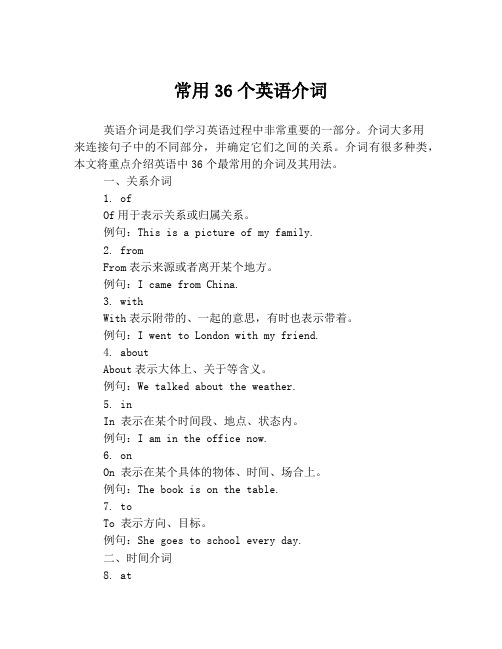
常用36个英语介词英语介词是我们学习英语过程中非常重要的一部分。
介词大多用来连接句子中的不同部分,并确定它们之间的关系。
介词有很多种类,本文将重点介绍英语中36个最常用的介词及其用法。
一、关系介词1. ofOf用于表示关系或归属关系。
例句:This is a picture of my family.2. fromFrom表示来源或者离开某个地方。
例句:I came from China.3. withWith表示附带的、一起的意思,有时也表示带着。
例句:I went to London with my friend.4. aboutAbout表示大体上、关于等含义。
例句:We talked about the weather.5. inIn 表示在某个时间段、地点、状态内。
例句:I am in the office now.6. onOn 表示在某个具体的物体、时间、场合上。
例句:The book is on the table.7. toTo 表示方向、目标。
例句:She goes to school every day.二、时间介词8. atAt 表示时间的具体点,通常与钟表时间连用。
例句:I will meet you at 2 o'clock.9. onOn 表示在某个具体的时间点。
例句:My birthday is on May 1st.10. inIn 表示在某个时间段内。
例句:I will return to China in six months.三、方向介词11. in front ofIn front of 表示前面。
例句:There are two chairs in front of the desk.12. behindBehind 表示后面。
例句:The cat is hiding behind the sofa.13. aboveAbove 表示在上方。
例句:The sun is above the clouds.14. belowBelow 表示在下方。
英语介词用法大全

英语介词用法大全★早、午、晚要用in,at黎明、午夜、点与分。
年、月、年月、季节、周,阳光、灯、影、衣、冒in。
将来时态in...以后,小处at大处in。
有形with无形by,语言、单位、材料in。
特征、方面与方式,心情成语惯用in。
介词at和to表方向,攻击、位置、恶、善分。
★日子、日期、年月日,星期加上早、午、晚,收音、农场、值日on,关于、基础、靠、著论。
着、罢、出售、偷、公、假,故意、支付、相反,准。
特定时日和“一……就”,on后常接动名词。
年、月、日加早、午、晚,of之前on代in。
步行、驴、马、玩笑on,cab,carriage则用in。
★at山脚、门口、在当前,速、温、日落、价、核心。
工具、和、同随with,具有、独立、就、原因。
就……来说宾译主,对、有、方状、表细分。
海、陆、空、车、偶、被by,单数、人类know to man。
★this、that、tomorrow,yesterday,next、last、one。
接年、月、季、星期、周,介词省略已习惯。
over、under正上下,above、below则不然,若与数量词连用,混合使用亦无关。
…beyond超出、无、不能,against靠着,对与反。
besides,except分内外,among之内along沿。
同类比较except,加for异类记心间。
★原状because of,、owing to、due to表语形容词under后接修、建中,of、from物、化分。
★before、after表一点, ago、later表一段。
before能接完成时,ago过去极有限。
since以来during间,since时态多变换。
与之相比beside,除了last but one。
复不定for、找、价、原,对、给、段、去、为、作、赞。
快到、对、向towards,工、学、军、城、北、上、南。
but for否定用虚拟,复合介词待后言。
ing型由于鉴,除了除外与包合。
英语中常见介词用法总结
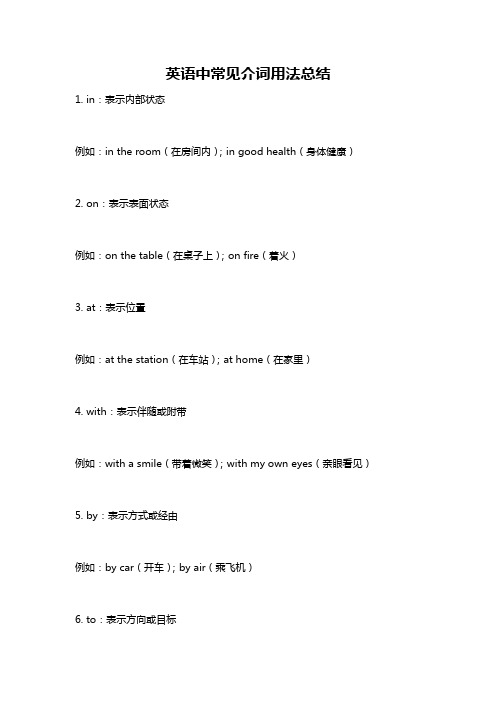
英语中常见介词用法总结
1. in:表示内部状态
例如:in the room(在房间内);in good health(身体健康)2. on:表示表面状态
例如:on the table(在桌子上);on fire(着火)
3. at:表示位置
例如:at the station(在车站);at home(在家里)
4. with:表示伴随或附带
例如:with a smile(带着微笑);with my own eyes(亲眼看见)5. by:表示方式或经由
例如:by car(开车);by air(乘飞机)
6. to:表示方向或目标
例如:to the park(去公园);to the moon(到月球)
7. from:表示出发地或来源
例如:from Beijing(来自北京);from the magazine(从杂志中)
8. for:表示目的或用途
例如:for a birthday party(为了生日派对);for writing(用于写作)
9. of:表示属于或关系
例如:the book of Harry Potter(哈利·波特的书);the sister of Mary(玛丽的姐姐)
10. with:表示具有或伴随
例如:a man with a gun(拿着枪的人);a girl with long hair(长发女孩)。
- 1、下载文档前请自行甄别文档内容的完整性,平台不提供额外的编辑、内容补充、找答案等附加服务。
- 2、"仅部分预览"的文档,不可在线预览部分如存在完整性等问题,可反馈申请退款(可完整预览的文档不适用该条件!)。
- 3、如文档侵犯您的权益,请联系客服反馈,我们会尽快为您处理(人工客服工作时间:9:00-18:30)。
besides, except 分内外,among 之内along 沿
例:The design has many other advantages besides lower cost.除费用低外,该设计还有许多其他优点。
(优点包括在内)
He had no time to prepare his lecture, besides which he was unwell.他没有时间准备讲稿,而且他的身体也不大舒适。
Every one of us, except her, went to see the exhibition. 除她外,我们都去参观了展览会。
He gets up early every day except Sunday. 除星期日外他每天早起。
Nobody was late except me. 除我以外,没人迟到。
同类比较except,加for 异类记心间。
He's composition is good, except for some spelling mistakes.他的这篇作文写得很好,只是有几处拼写错误。
(非同类比较用except for)
She was all alone in the world except for an old aunt. 除了有一个老姑妈,她别无亲人。
Anna felt disappointed when she found out they had gone swimming without her. (without = except) 当安娜发现除她外,他们都去游泳了,她感到很失望。
Lion Head Hill is not worth seeing except for its old temples.除了那些古寺以外,狮头山没什么可看的。
Among other things, we are interested in drawing.我们对图画和别的一些东西很感兴趣。
(among 之内即包括在内)
原状because of, owing to, due to 表语形容词
例:Owing to our joint efforts, the task was fulfilled ahead of schedule.由于我们的共同努力,任务提前完成了。
注:Owing to 和because of 都做原因状语,而due to 只能做表语形容词。
所以此句。
owing to 的介词短语做原因状语。
All our achievements are due to the correct leadership of our Party.我们的一切成绩都归功于党。
(due to 做表语形容词)
Under 后接修、建中,of,from 物化分
例:The road is under repair now.这条路正在修建中。
The new railway is still under construction. 新铁路尚在修筑中。
(不能用in)
under discussion 在讨论中(不能用in) under considerate 在考虑中(不能用in)
The desk is made of wood. 桌子是木头做的。
(物理变化用of)
The wine is made from grape. 这种酒是用葡萄酿造的。
(化学变化用from)
The bridge is made of steel. 这座桥是钢制的。
(物理变化)
Steel is made from iron. 钢是由铁炼成的。
(化学变化)
before, after 表一点,ago, later 表示一段
即before, after 常表示一个点的时间状语,而ago,later 常表示一段的时间状语。
例如:前天the day before yesterday; 前年the year before last; 大上星期the week before last 等等都表示点状语的。
要想准确无误地使用好before 和ago, after 和later 比较困难,但要是以“点”和“段”来区别就容易得多。
例:晚饭前before supper
解放前before liberation
1970 年前before 1970
文革前before cultural revolution
国庆前before National Day
入大学前before coming to college
这些都是“点”状语,因为1970年前即1970年1月1日前。
国庆节即10月1日前。
ago 表示一段时间。
例:一分钟前 a minute ago
半小时前half an hour ago
两天前two days ago
一星期前a week ago
五年前five years ago
因为 a minute, half an hour, two days, a week, five years 等都表示一段时间,所以用ago。
以及ten days later 等皆如此。
before 可接完成时,ago 过去级有限
这时的before 是连词(也可做介词)
例:We had scarcely left our school before it began to rain.我们刚离开学校,天就下雨了。
(完成时)
I had studied French for four months before I came here.我来这儿以前就已学了四个月法语了。
(before 接完成时)
He fell ill three days ago.他病了三天了。
(ago 则只能接动词过去式,同时注意瞬间动词的问题。
)
He left two months ago. 两个月前他离开了。
(同上)
I met her a few minutes ago. 我在几分钟前碰到他了。
(同上)
Since 以来during 间,since 时态多变换。
与之相比beside, 除了last but one。
即beside 的一般用法是“在……旁边”, 但还有“和……相比”等特殊用法。
例:I felt so weak in spoken English beside them. 和他们相比,我感到我的口语太差。
Beside work and study, all else was trivial. 同工作和学习比起来,其他一切都是小事。
除了last but one,即but 多指“除了”的意思,也有“倒数第几”的意思。
last but one 即不是最后一个。
例:I haven't told anybody but one. 除了我爱人,我谁也没告诉。
(除了)
Who but a fool would study foreign language well if he is a hard working one.如果他勤奋好学的话,除了傻瓜谁都能学好外语。
(除了)
Look at the last page but one. 请看倒数第2页。
He was the last but three in maths examination this time. 他这次数学考试成绩倒数第四。
They live in the next house but one. 他们住在隔壁过去一家。
